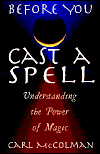
“I need to cast a spell to make Fred in my chemistry class fall in love with me.” “Where can I find a book that’ll give me a spell to make me lose 10 pounds by Friday?” “I need a spell book that has a spell in it to make my boss give me a raise.” “I’m gonna cast such a powerful spell on that jerk who insulted me that he’ll never know what hit him!”
Is being a Witch only about casting spells for love, money, or revenge? Some writers seem to think so. Gotta problem? they ask. Buy my book. There are so many of these books that it’s no wonder some newbies—and some “oldbies” too—think spellcasting is all there is to the Craft. Cast the right spell and you’ll have a better life. It’s easy. Isn’t it?
Here, thank Goddess, is a voice of reason. Carl McColman, well known for his common sense and plain talking, explains that magic “looks like an exciting shortcut to power.” It’s “a spiritual tool that is effective for achieving one’s dreams. But like any other tool, … it must be put to work. To succeed at magic,” he warns us, “you have to work hard” (p. 24). Yes, magic is real, but there’s more to it than we may think.
This is a pithy book, not only short but also full of basic good sense. McColman gives us thirteen myths of magic and their reality checks. No. 1: “Magic is a tool for getting what you want.” Reality check: Real magic involves far more than just getting your way.” In the next chapter, he gives thirteen laws of magic. No. 4: “Do everything you can to achieve your goal on a mundane level.” No. 12: “Questionable motives produce questionable results.”
What McColman wants us to do is to think first about the ethics behind our magic, and ethics is a topic to which he returns again and again. What do we need to know about ethics before we cast a spell? Everything has consequences, and some unintended consequences bounce back and bite you.. Say you cast a spell on Fred to make him fall in love with you over the Bunsen burners. If Fred fell in love with you, would it be because of your spell or because you’re genuinely loveable? With the spell, you’d never know. There would always be that niggling doubt that he really loved you. More important—how would you like it if someone cast a spell on you? Do you think a weight-loss spell can really work better than proper diet and exercise? (If you do, what planet do you live on?) What if you cast the spell on your boss? Are you doing enough good work to earn that raise? Do you come to work on time and spend the day working? Or do you show up whenever and spend a couple hours a day surfing the Net? If you cast a revenge spell, think about this: what if everyone was casting revenge spells all the time? What would our world look like then?
McColman refers to Starhawk’s book, Truth or Dare, in which she defines three kinds of power. There’s power-over—the kind we see, McColman says, in the emperor in Star Wars, in Lord Voldemort in the Harry Potter books, and in Sauron in Lord of the Rings. There’s nothing wrong with power itself, except, as these characters show, it tends to corrupt. How to keep from being corrupted by power is to remember that true magical power is based in spirituality. Spiritual power is power-from-within, our personal power, which we develop through spiritual practice. It’s also power-with, which is basically strength in numbers, whether it’s the strength of a coven or a workers’ union. Magical power is something you learn from an ethical teacher, something you practice along with meditation, something you learn as you learn ethical behavior, and something you share with other people. And that’s what you need to know before you cast a spell.
~review by Barbara Ardinger, Ph.D.
Author: Carl McColman
New Page Books, 2004
